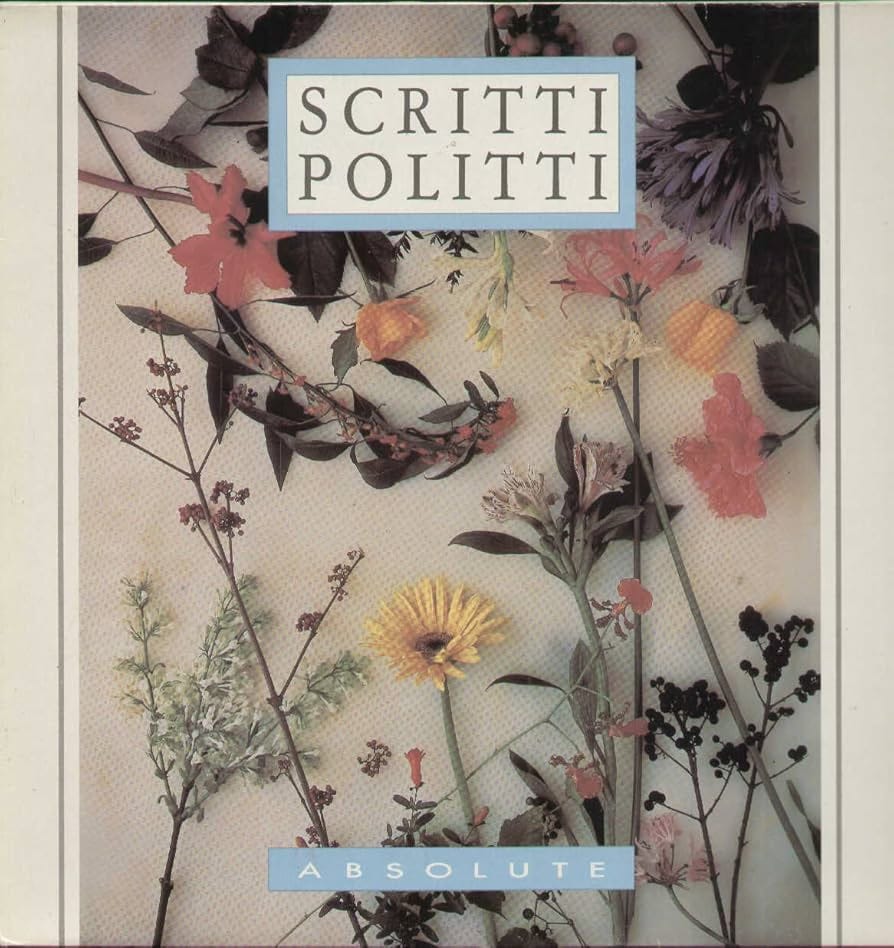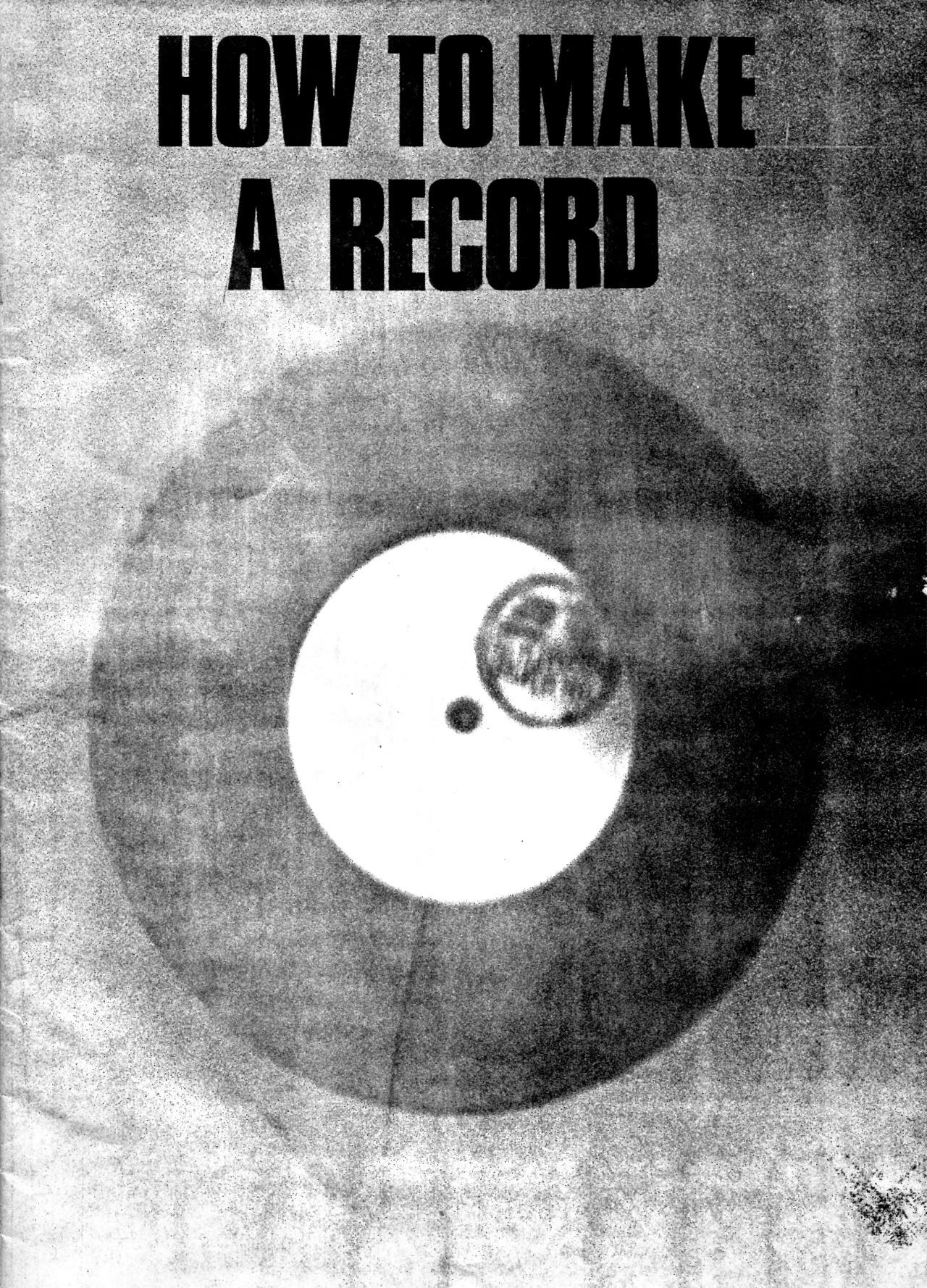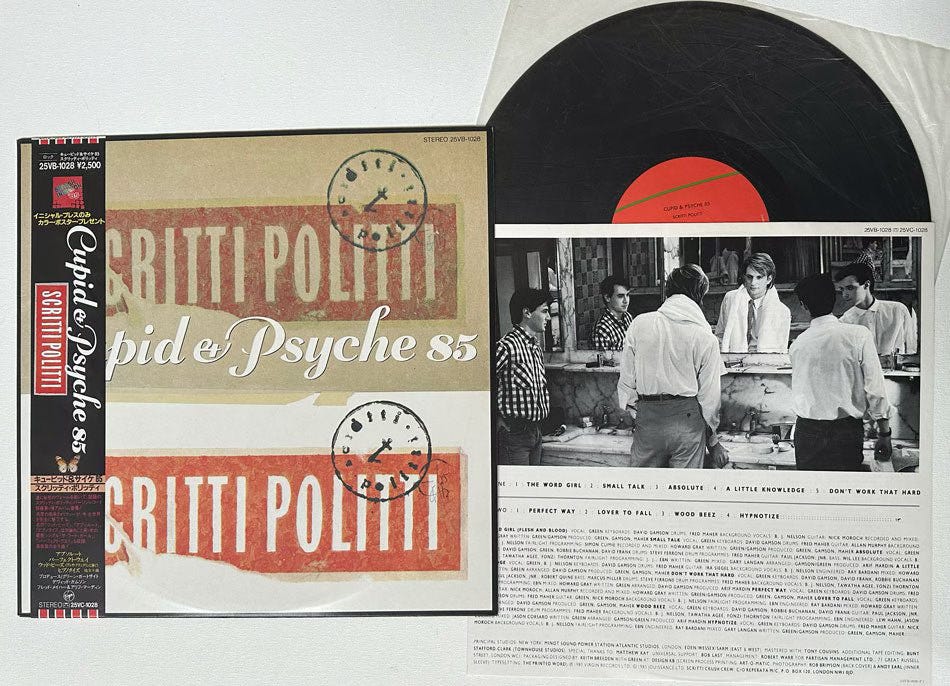Scritti Politti and how a young communist punk artist ended up making one of the most polished eighties albums.
The Twelve Inch 125 : "Absolute" (Scritti Politti)
Welcome, I’m Pe Dupre and this is “The Twelve Inch”, a newsletter that tells the history of dance music between 1975 and 1995, one twelve inch at a time.
If you’ve received this newsletter, then you either subscribed or someone forwarded it to you. If you fit into the latter and want to subscribe, please do so. That way you will not miss a single episode.
The Summer of '85: Anticipating a New Sound
In the summer of 1985, the highly anticipated album "Cupid & Psyche'85" was released. I had been eagerly waiting for this album after spending the previous summer of 1984 playing two twelve inches, "Wood Beez" and "Absolute," on repeat. These tracks exemplified the perfect blend of pop and dance. Although it took Scritti Politti almost a year to release the album, it was well worth the wait.
Scritti Politti: From Crystal Clear Pop to Silence
At that time, I knew little about Scritti Politti. To me, they were the new, bright talents delivering wonderful, crystal-clear pop music. I hoped they would stay forever, continuing to create such splendid music. My hopes were further fueled by two “Scritti Politti” songs/productions a year later: "L Is For Lover" by Al Jarreau and "Love Of A Lifetime" by Chaka Khan. However, after releasing their next album, "Provision", in 1988, they vanished. What happened to them? And where did they come from?
From Political Beginnings to Pop Perfection
Scritti Politti formed in 1977 by a group of art students in Leeds with a distinctly political edge. The band's name translates roughly to "political writing," and they encouraged listeners to create their own music independently of the corporate music industry. They exhibited a do-it-yourself attitude, hand-making the sleeves for their first singles and publishing a detailed list of production costs. Their distribution was handled by Rough Trade, and they even published a booklet, "How To Make A Record," to assist aspiring artists.
However, after a few singles, their plans for an album were interrupted by a disaster. After a concert supporting Gang of Four in Brighton, lead singer Green Gartside suffered a crippling anxiety attack, which led to his hospitalization. During his recovery in a Welsh cottage, Green began to rethink and reshape Scritti Politti. Influenced by black music and disillusioned with Marxism, he decided to enter the mainstream.
The Sweetest Girl: A New Chapter
"The Sweetest Girl," released in 1981, marked the start of a new chapter for Scritti Politti. Green now aimed for commercial success, wanting to be on "Top Of The Pops." Although the song sounded like a hit, it only reached No. 64 on the charts. Despite this, it received positive reviews and was featured on the NME and Rough Trade's C81 cassette compilation.
“New Pop” A New Genre For The Eighties
C81 was released alongside the end-of-year 1980 issue of NME, where music critic Paul Morley (future co-founder of ZTT, together with Trevor Horn and creator of the “Frankie” mania) laid out what was essentially a manifesto for "New Pop." He envisioned a future where emerging bands and artists, brimming with confidence and urgency, would tackle the mainstream head-on and outshine it on its own turf.
In this new era, funk and disco, once dismissed, were now celebrated as “excellent vehicles” for future success. The real excitement was in the mainstream, where New Pop thrived as a genre built on singles and twelve-inch records. The movement aimed to reinvigorate the radio, making every single count. They wanted the big display in the supermarket not a high shelf in a dusty corner shop. The ethos of New Pop embraced values of health, cleanliness, mobility, and ambition, setting the stage for a dynamic and accessible musical revolution.
Green’s Personal Journey
For Green Gartside, the transition from post-punk to polished pop was deeply personal. He viewed his own physical and mental health struggles during the early Scritti Politti days as symbolic of the post-punk movement's shortcomings. Initially embracing the DIY ethos, Green eventually saw it as a lost cause and shifted his focus towards "quality control."
In August 1980, NME launched "Garageland," a new service to spotlight cassette-releasing bands without independent distribution. However, just eight months later, the service was discontinued, as amateurism began to be seen as a lack of ambition.
Although Scritti Politti maintained their independent spirit and continued working with Rough Trade, the release of "The Sweetest Girl" made it evident that Rough Trade couldn't provide the chart success they desired. The shift was clear: it was time for Scritti Politti to aim higher and embrace the mainstream.
Green Gartside's Mainstream Manifesto
When Green Gartside returned from Wales, he made a bold declaration: "What has meaning is what sells, and what sells has meaning." The lackluster performance of Scritti Politti's debut album, "Songs To Remember," strained their relationship with Rough Trade, with Green criticizing the label for spending money on "silly groups with silly music." Despite this, Green was recognized as a rising star, attracting interest from major labels.
Seizing the opportunity, Scritti Politti signed a lucrative deal with Virgin Records. They transformed into a production powerhouse, akin to the British Electric Foundation (B.E.F.) created by Heaven 17 members Martin Ware and Ian Craig Marsh. The goal was clear: (do everything to) achieve success and make a significant impact on the mainstream music scene.
Transition to Virgin Records and the Birth of a Masterpiece
In 1983, influenced by the hip-hop sounds of New York, Green moved there and began collaborating with Fred Maher (drums) and David Gamson (keyboards). Their first result was "Wood Beez," produced by the renowned Arif Mardin and featuring Aretha Franklin samples. This move marked a significant shift from Scritti Politti's DIY ethos.
“Wood Beez" and "Absolute" were followed by the album "Cupid & Psyche '85," a masterclass in polished production and exquisite songwriting. Despite facing criticism for making bourgeois pop music, Green remained unfazed, focusing on creating perfect pop.“The idea of the critical privileging of rock music as the unmediated, the truthful and honest as against pop as the derivative, mediated, commercial and superficial . . . that interested me. After the album came out I got endless stick for making bourgeois pop music, but stick has never bothered me”
The Struggles and Legacy of Green Gartside
The process of creating new music was slow and laborious, exacerbated by Green's mental health struggles. After the success of Cupid & Psyche it took them a long time to release the next album “ Provision”. David Gamson remembers : It was the most digital sounding analogue record ever made...which is what a lot of people don’t like about it... It was one long very exhausting grind... I got physically ill at the end of that record because I was so exhausted
By the time "Provision" was released in 1988, Green's health had deteriorated significantly, leading to a complete collapse. "Promoting Cupid & Psyche knocked chunks out of my already fragile psyche... I was in a poor state, physically and psychologically. I was living in various hotels and apartments in America. Cocaine was briefly a problem. After promoting Provision, that's when the complete collapse happened."
Green retreated to Wales, and it wasn't until 1999 that Scritti Politti released another album. Despite his health challenges, Green continued making music, and in recent interviews, he expressed confidence in the unreleased songs he has created over the years. On the question if we ever will get to hear them Green Gartside answered : “Yeah, unquestionably. I’m the last person ever to have much confidence in myself. But one thing of which I’m totally certain, in all these hours of music that I’ve made: This stuff is better than anything else I’ve ever written lyrically or musically. I mean, absolutely. Significantly better.”
The End of New Pop and Scritti Politti's Enduring Influence
"Absolute," a big summer hit in Europe in 1984, was part of Scritti Politti's unique approach to extended mixes. There is no twelve inch/extended version as such. Each of the Cupid & Psyche’85 singles has a (sort-of) mix between an extended & dub version called “version”. In The UK “Absolute” would not make it into the Top 10 and neither of the first singles would chart in the Billboard HOT 100. It was only the fifth single “Perfect Way” that would become a US pop hit, peaking at n°11. “Absolute” would be combined with “Wood Beez” on a twelve inch release in the US and would peak at n°4 in the Billboard dance charts.
"New Pop," which sought to combine commercial success with artistic ambition, gradually disappeared in the late 1980s as bands either changed direction or produced more formulaic music.
Call to Action
The tale of Green Gartside is one we've heard countless times: a talented artist caught in the whirlwind of the music industry, where the demands and pressures often clash with personal well-being. Though Green’s outward demeanor may have evolved, his initial skepticism about the industry was only reinforced as he tasted success. He sums it up perfectly in the documentary Tinseltown To Boogie Down with a quote that leaves little to the imagination: “The music business is a cruel and shallow money trench, a long plastic hallway where thieves and pimps run free and good men die like dogs. There's also a negative side”
But what about you? Were you a fan of Scritti Politti? Did Cupid & Psyche '85 strike a chord with you?
Further reading (or should I say watching)
There are a number of interesting video’s/links :
So You Wanna Hear More ?
I thought you would !
It’s fun to write about music but let’s be honest. Music is made to listen to.
Every week, together with this newsletter, I release a 1 hour beatmix on Mixcloud and Soundcloud. I start with the discussed twelve inch and follow up with 10/15 songs from the same timeframe/genre. The ideal soundtrack for…. Well whatever you like to do when you listen to dance music.
So what’s in this week’s mix ?
Pure Pop thrives on singles and twelve inches, and this week’s mix features some prime examples. We kick off with a blend of the single and dub (version) mix of "Absolute." Uniquely, "Absolute" is one of those rare tracks where the dub version often took center stage, with the opening line introducing “the B-side” signaling the transition.
The first segment is packed with quintessential New Pop tracks from Hipsway, Kajagoogoo, and Duran Duran. Of course, no New Pop mix would be complete without Paul Morley’s brainchild, Frankie Goes To Hollywood.
In the middle section, we dive into some rare mid-eighties twelve inches, featuring Thomas Dolby's "The Devil Is An Englishman" and William Orbit’s eighties band Torch Song with their twelve-inch mix of "Tattered Dress."
We wrap up this week's mix with four Italo disco gems from Video, Doctor’s Cat, My Mine, and Bandolero, ensuring a vibrant and eclectic end to our Pure Pop journey.
Enjoy !
Next week, we dive into the intriguing tale of a promising new rock band from 1978 facing an unexpected twist. "Surely, they're not going to make disco...are they?"














Beautiful layout, PeDupre, of Green, his talent, and the incredible music this American picked up on in the mid-'80s! In the U.S., the handful of Scritti fans there were, knew the band to live on Warner Bros. Records.
As promised, here's my story on discovering Green and S.P. (in particular, the "Cupid & Psyche 85 album): In 1985, I was about 2 years removed from a previous career in the "biz": 4 years in radio (2 college and 2 commercial FM rock stations in Houston and Baton Rouge, LA), and about 5 years in retail records in Houston and L.A.
So, while pursuing a new career, and attending college as a 30-year-old, I was still keeping up, as I could, on music and happenings thru various rock publications (far less frequently than I used to, though)! In the summer of '85 (and now living in L.A.), I picked up an L.A. Times, and read a review by noted music critic, Robert Hilburn (of whom I'd been aware for many years, and appreciated his writing style and tastes).
I remember nothing about his review of the newly-released "Cupid" album other than one word: "Precious." Without hearing a note, I went out and bought the (more than likely) CD (as opposed to cassette or LP). I had to hear a band whose only word Hilburn used to describe them was, "precious"!
Well, needless to say, he wasn't wrong, and I instantly fell in love with Green and the band's music, and ended up buying a couple things previously released (that were far more rap and dub-related, and, ultimately, music I didn't care for). Of course, I snapped up "Provision" upon its release, too, and loved that one, as well.
Moral of the story, fellow music writers: If you have a long enough career, you will gain "fans" who get to know and trust what you say about music and its creators (assuming you've done it correctly!). In Hilburn, I appreciated then (as now) his freedom (especially as a male writer) to use a word like "precious" to describe a male group with no fear! He heard it, he felt it, he wrote it! And, I'm pretty sure Green would appreciate how Hilburn's brave, but accurate, word choice prompted at least one album sale, and a lifelong fan of a gifted artist!
Thanks, PeDupre, for shining a light on Green and his gift! BTW, I bought all the 12"-ers I could find from those 2 particular albums ("Cupid" and "Provision"). Stateside Warner Bros was pretty generous with those releases (with new mixes, etc), but I also had no problem buying the "import" 12-inchers on the UK Virgin discs, and amassed quite a few...usually with different sleeves and new mixes!
Just a few thoughts on Scritti from a British perspective. I'm old enough to have followed Green's turbulent journey through post punk via the UK music press. I dutifully bought Songs To Remember but was extremely disappointed by the standard of production. Cupid and Psyche therefore came as quite a revelation. It's worth noting that by the mid 80s, in the UK at least, pop was being made primarily for adults for the first time since before the birth of rock 'n' roll in the fifties. Production was therefore becoming increasingly sophisticated to appeal to an adult market. Having said that, Cupid and Psyche was in a different class to other adult pop and still sounds almost intimidating to me in that it seems to have been beamed down from a higher civilisation.